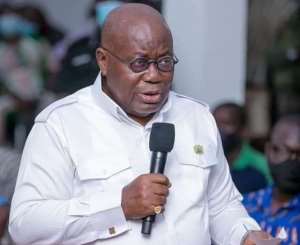
It is very mysterious for an elected President to delay the appointment of his or her representatives at the sub-national level. The MMDCEs are development agents and so they occupy very crucial positions in the structure of governance. The delay of their appointment should cause some uneasiness to the President of the day.
The appointment of MMDCEs is not restricted by any law in Ghana. The delay in the appointment of the ambassadors of a President at the sub-national level points to a process that is not opened and not democratic. The President is supposed to appoint persons who possess the abilities and skills to help his or her government deliver superior welfares and policies to the people of Ghana. A person so elected needs to know the individuals to serve as Ministers and MMDCEs in his or her government.
Article 243 (1) of the Constitution of Ghana authorizes the elected President of Ghana to appoint his or her MMDCEs with prior approval of not less than two-thirds majority of members of the Assembly present and voting at the meeting. The current system does not involve the two-thirds majority of the Assembly members during the vetting of persons an elected President deem fit to govern the local people. The vetting of prospective MMDCEs who are selected after a vigorous process of screening is done by party officials or a committee set up by the President to undertake such an exercise. The team that undertakes the vetting does not have any backing of the law such that their work becomes legal and binding on the President who is required to appoint the people vetted as prospective MMDCEs.
The current experience of delaying the appointment of MMDCEs will worsen when names are mentioned. It is likely some Assemblies will vehemently reject persons who are recommended by the team that did the vetting. This creates an opportunity for bribery, corruption and other undemocratic maneuverings that undermine the principle of democracy. The current system of vetting prospective MMDCEs is unhealthy and not fitting in the ideals of democratic governance. It gives the two-thirds majority Assembly members an opening to engage in money-making practices at the Assemblies during the approvals.
The appointment of MMDCEs, if intended to be an open system, should adopt the nature and procedure of the Parliament of Ghana, where persons are vetted robustly by a committee set up for such an endeavor. The approval mechanism at the sub-national level is compromised by the approach adopted currently. The failure to execute the policy of electing MMDCEs should stir new thinking and policy desires to resolve the difficulty in engaging persons as MMDCEs.
The elected President needs to recognize persons who can represent him at the local level. This can be done by a consultative approach. The members of the various Assemblies have the determinate authority to approve the appointment of individuals as MMDCEs. It is unanticipated for such central figures to be ignored in the vetting process.
It is indispensable to look for a substitute approach for the current system. The law gives the President the chance to consult with not less than two-thirds majority of the members of the Assembly present and voting at a meeting held for that purpose. Yet, the present approach is not consultative but an imposition of persons on the local people, to lead the institutions and the people at the local level.
I conscientiously suggest the amendment of Article 243 (1). The amendment of Article 243 (1) does not require a referendum as it is not an entrenched provision of the Constitution. The said Article should be amended to include a clause that deletes the provision of the voting of a two-third majority. The vetting of prospective MMDCEs by any of the local government agencies such as the Local Government Service or the National Association of Local Authorities could be instituted. A push for such an amendment is plausible to solving the current challenges in engaging MMDCEs. The system of voting to approve of MMDCEs by a two-third majority present and voting at a meeting is conducive for vote-buying and a blur to the practice of a modern democracy.
BY Emmanuel Kwabena Wucharey
Economics Tutor, Advocate and Religion Enthusiast.




 Dumsor must stop vigil part 2: We’ll choose how we demonstrate and who to partne...
Dumsor must stop vigil part 2: We’ll choose how we demonstrate and who to partne...
 2024 elections: NDC stands on the side of morality, truth; NPP isn't an option —...
2024 elections: NDC stands on the side of morality, truth; NPP isn't an option —...
 Akufo-Addo has moved Ghana from 'Beyond Aid' to ‘Beyond Borrowing’ — Haruna Idri...
Akufo-Addo has moved Ghana from 'Beyond Aid' to ‘Beyond Borrowing’ — Haruna Idri...
 Train crash: NDC is full of evil mindset; driver who 'deliberately' parked the c...
Train crash: NDC is full of evil mindset; driver who 'deliberately' parked the c...
 Dumsor: Energy Minister must be fired; it’s becoming unbearable — IES
Dumsor: Energy Minister must be fired; it’s becoming unbearable — IES
 #DUMSORMUSTSTOP: IMANI responds to Yvonne Nelson's call for a joint vigil
#DUMSORMUSTSTOP: IMANI responds to Yvonne Nelson's call for a joint vigil
 'Obiara b3didi' — Manhyia South NPP Chairman fights for resourcing of NPP grassr...
'Obiara b3didi' — Manhyia South NPP Chairman fights for resourcing of NPP grassr...
 Dumsor: This thing is becoming unbecoming, collapsing our business — Nana Ofori ...
Dumsor: This thing is becoming unbecoming, collapsing our business — Nana Ofori ...
 Dumsor: It'll be no more by the end of April — Gideon Boako assure Ghanaians
Dumsor: It'll be no more by the end of April — Gideon Boako assure Ghanaians
 "I can now see clearly with my two eyes, thanks to the generosity of Afenyo-Mark...
"I can now see clearly with my two eyes, thanks to the generosity of Afenyo-Mark...
